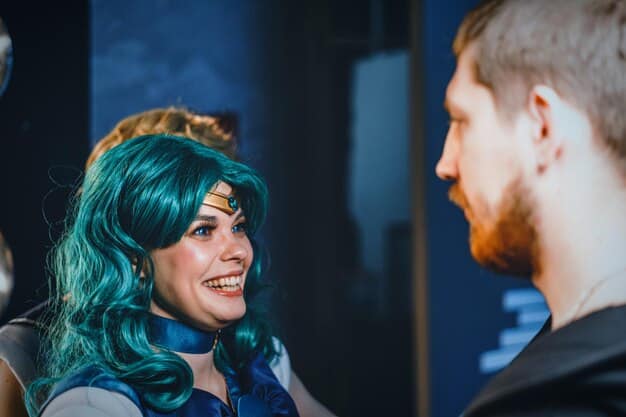The Dark Side of Fandom: When Obsession Becomes Harmful

The dark side of fandom emerges when passionate devotion to a cult classic transforms into harmful obsession, leading to harassment, stalking, and even violence.
The thrill of discovering a hidden gem, a film or show that resonates deeply and forms a tight-knit community, is what makes cult classics special. However, this passionate devotion can sometimes cross a line, leading to the dark side of fandom: when cult classic obsession crosses the line into unhealthy and even dangerous territory.
Understanding Cult Classic Fandom
Cult classics occupy a unique space in the world of entertainment. These films and shows, often initially overlooked by mainstream audiences, develop a dedicated following that elevates them to something more than just entertainment. But what is it about these particular works that inspires such intense loyalty?
The Appeal of Niche Interests
Cult classics often cater to niche interests, offering something different from the typical blockbuster fare. This can be incredibly appealing to individuals who feel like they don’t quite fit in with mainstream culture and are looking for something that speaks directly to their unique sensibilities.
The sense of belonging and shared identity that comes with being a fan of a cult classic is a powerful draw for many. This is more than just liking a movie; it’s about finding a community of like-minded individuals who share your passions.
The Power of Community
The feeling of belonging can also explain why the dark side of fandom sometimes develops. When the cult becomes central to identity, other elements that make up a healthy and balanced life, such as work, hobbies, and other social relationships, can take a back seat.
- Shared identity and a strong sense of community.
- Nostalgia and emotional connections to the content.
- A feeling of exclusivity and being “in the know.”
- The opportunity for creative expression through fan fiction, cosplay, and art.
In summary, the world of cult classics offers a haven for those seeking unique stories and strong communities. This sense of belonging can be incredibly positive, until the passion goes too far.
The Line Between Passion and Obsession
There’s a significant difference between being a dedicated fan and becoming consumed by obsession. Understanding this distinction is crucial in navigating the world of fandom and preventing it from turning toxic. But when does enthusiasm become unhealthy?
Identifying Obsessive Behaviors
Obsession often manifests in behaviors that are excessive and disruptive to daily life. It can include an all-consuming preoccupation with the cult classic, neglecting personal responsibilities, and isolating oneself from family and friends to focus solely on fandom activities.
One clear indicator of an unhealthy obsession is when a fan’s identity becomes entirely wrapped up in their love for the cult classic. When the fandom is not just something that you enjoy, but who you are, the obsession may be out of control.
The Role of Social Media
These days, social media can amplify both the positive and negative aspects of fandom. Online platforms provide a space for fans to connect, share their love, and engage in discussions. They can also facilitate the spread of toxicity.

- Spending excessive time online discussing the cult classic.
- Harassing or bullying other fans who hold differing opinions.
- Stalking or attempting to contact actors or creators associated with the work.
- Experiencing distress when unable to engage with the fandom.
In short, while passion enhances life and fosters community, obsession consumes it, leading to isolation, distress, and potentially harmful actions.
Examples of Toxic Fandom in Cult Classics
Unfortunately, the dark side of fandom has manifested in various ways within cult classic communities. These examples serve as cautionary tales, highlighting the potential consequences of unchecked obsession and the importance of maintaining healthy boundaries.
Harassment and Bullying
One of the most common forms of toxic fandom is online harassment and bullying. This can involve attacking other fans for their opinions, criticizing their cosplay, or spreading rumors and misinformation about actors or creators. It is often rooted in a sense of entitlement.
The anonymity of the internet can embolden individuals to engage in behaviors they might not otherwise exhibit in person. This digital aggression can have a devastating impact on the mental health of those targeted.
Stalking and Threats
In extreme cases, obsession can escalate to stalking and even threats of violence. This is most often directed towards actors or creators who dare to deviate from fan expectations or perceived canon. It’s a form of invasion and control.
The Case of [Hypothetical Cult Classic]
Let’s imagine a cult classic TV series, ‘[Hypothetical Cult Classic],’ gains immense popularity long after its original run. As a result, different factions appear within the fanbase. If writers dare change the plot or direction of characters in the revival, they find themselves faced with personal attacks.
- The Game of Thrones Fandom: Disappointment with the final season led to petitions and harassment of writers.
- The Star Wars Fandom: Intense criticism directed at actors and directors perceived to have “ruined” the franchise.
- The Rick and Morty Fandom: An incident involving harassment of McDonald’s employees over a limited-edition sauce.
Therefore, these examples underscore the importance of establishing boundaries within fandom and addressing toxic behavior promptly.
The Psychological Roots of Obsessive Fandom
To better understand the dark side of fandom, it’s important to explore the psychological factors that may contribute to obsessive behavior. These might include underlying mental health conditions, personality traits, and the dynamics of group behavior. Where does this all come from?
Mental Health and Fandom
For some individuals, obsessive fandom may be a symptom of an underlying mental health condition, such as anxiety, depression, or obsessive-compulsive disorder (OCD). It can serve as a coping mechanism or a way to escape from difficult emotions.
It’s important to remember that not everyone who is obsessed with a fandom has a mental health condition. However, it’s crucial to be aware of the potential for obsessive fandom to mask or exacerbate existing mental health issues.
The Role of Personality Traits
Certain personality traits, such as perfectionism, need for control, and social anxiety, may also play a role in the development of obsessive fandom. Individuals with these traits may be more likely to become overly invested in a cult classic and its community.

- A need for control: Seeking to regulate or manipulate the narrative or characters.
- Social anxiety: Using fandom as a substitute for real-life interactions.
- Perfectionism: Demanding that the cult classic adheres to a specific vision.
In closing, understanding the psychological roots of obsessive fandom can help us develop strategies for prevention and intervention and to provide care for those struggling.
Coping Strategies for Unhealthy Fandom
If you or someone you know is struggling with unhealthy fandom, there are several coping strategies that can help regain balance and perspective. These steps emphasize self-awareness, boundary setting, and seeking support when needed.
Setting Boundaries
One of the most important steps is to establish healthy boundaries with the fandom. This means limiting the amount of time spent engaging with the cult classic, setting rules about online behavior, and prioritizing real-life relationships and responsibilities.
It is often hard to set good boundaries when you’re dealing with passion, but doing so can provide a safety barrier between reasonable enjoyment and something more pernicious.
Seeking Support
Talking to a trusted friend, family member, or therapist about your struggles can also be incredibly helpful. An outside perspective can provide valuable insights and support. And if you are being harassed or bullied, it’s important to report the behavior to the appropriate authorities.
Embrace Other Hobbies
Diversifying interests can help decrease reliance on one source for your identity and happiness. Engaging in other hobbies and activities can give life balance and social connection.
- Limit time spent on forums or social media related to the fandom.
- Remind yourself that the cult classic is not your entire identity.
- Take breaks from engaging with the fandom to focus on other activities.
Therefore, remember that fandom should be a source of joy and connection, not a burden or a source of distress. By taking proactive steps to manage your engagement, you can ensure that your love for a cult classic remains a positive force in your life.
Promoting Healthy Fandom: A Call to Action
The key to preventing the dark side of fandom from taking hold lies in fostering a culture of respect, empathy, and responsible engagement. This requires a collective effort from fans, creators, and online platforms. We all have a part to play.
Education and Awareness
Raising awareness about the potential dangers of toxic fandom is crucial. This can involve creating educational resources, hosting workshops, and promoting discussions about responsible fan behavior. Education is key in avoiding harm.
It’s important to emphasize that criticism and debate are healthy parts of fandom, but harassment and personal attacks are never acceptable. Setting good standards is key to preventing an unhealthy situation.
Moderation and Reporting
Online platforms have a responsibility to moderate their communities and take action against users who engage in harassment or other forms of toxic behavior. This includes implementing clear reporting mechanisms and enforcing community guidelines. Keep the digital spaces safe.
- Create and enforce clear community guidelines that prohibit harassment and hate speech.
- Empower fans to report toxic behavior and provide support to victims.
- Promote positive examples of fan engagement and discourage negative stereotypes.
In conclusion, by working together, we can create fandoms that are inclusive, supportive, and respectful for everyone and to make fandom a positive and enriching experience for all.
| Key Point | Brief Description |
|---|---|
| 📢 Obsessive Behavior | Excessive preoccupation disrupting daily life, such as neglecting responsibilities. |
| 😠 Toxic Examples | Includes harassment, stalking, and threats towards those involved with the content. |
| 🧠 Root Causes | Mental health conditions like anxiety or OCD, personality traits, and group influences. |
| 🛡️ Healthy Fandom | Setting boundaries, diversifying interests, reporting harassment, and promoting positive engagement. |
Frequently Asked Questions
▼
A cult classic is a film or show that has gained a dedicated following, often due to its unique content or rejection of mainstream trends, leading to a passionate fan base.
▼
Passion is a healthy enthusiasm that enhances life, while obsession consumes it, causing distress, isolation, and potential harm to oneself or others within the fandom.
▼
Signs include online harassment, stalking, making threats towards others, bullying those with differing opinions, personal attacks, and the spread of misinformation.
▼
Set time limits, avoid excessive engagement, diversify interests, and prioritize real-life relationships. Also, report any harassment or bullying that you observe or experience.
▼
Social media can amplify toxicity by allowing anonymity and quick sharing of aggressive content. Platforms should monitor communities, enforce guidelines, and provide support to those affected.
Conclusion
Navigating the world of fandom requires awareness, respect, and a commitment to healthy engagement. By understanding the potential pitfalls and embracing strategies for responsible behavior, fans can ensure that their passion remains a positive force in their lives and in the community.





